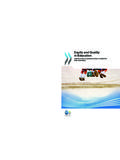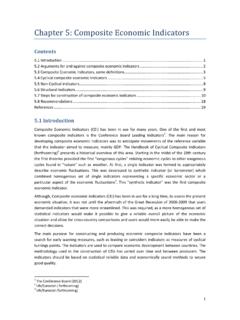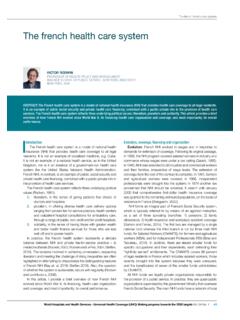Transcription of Political trust in the UK - Full Fact
1 trust in who to do what: what does trust really mean? Political trust in the UKAmy Sippittpg. Fact: Political trust in the UKFull Fact is the UK s independent factchecking this paperMisinformation and disinformation cause real harm to people s lives, health, finances and to democracy. We need good evidence on how to tackle it. Full Fact has set up a research programme to find that evidence and make it useful. In this briefing, Full Fact s Research Manager Amy Sippitt goes beyond the survey headlines to look at what trust really means. We would like to extend our warmest thanks to Bobby Duffy for his comments.
2 Full Fact 2 Carlton Gardens London SW1Y 5A Ak +44 (0)20 3397 5140D @FullFactK by Full Fact, June 2019 Registered Charity number 1158683 Published under the Creative Commons Attribution-ShareAlike International Licensepg. Fact: Political trust in the UKLook at any survey data on trust , and you ll see that the majority of the UK public generally says they distrust politicians, journalists and the government. Despite reports to the contrary, this has pretty much always been the , what do we really mean when we say we distrust politicians, or indeed any other profession or institution?
3 Measuring trust is hard. For starters, our stated amount of trust depends on what we re asking them to do. Asked if we trust the government to do what is right , more of us say we trust them than when we re asked if we trust politicians or government ministers to tell the truth . It also can be a difficult concept to measure through self-reporting. The philosopher Baroness Onora O Neill has commented how, where we can do nothing to check or investigate sources of information and their credentials we often, and reasonably, withhold trust and suspend both belief and disbelief in favour of cynicism and half-belief.
4 We may end up claiming not to trust , and yet for practical purposes place trust in the very sources we claim not to trust SHARE-SQUARE. That said, some preliminary experimental research by the international economic body the OECD suggests what we say in surveys about our levels of trust in government might not be completely far off from our levels of trust implied by our very low trust is undoubtedly difficult for a government, some academics have suggested that at least some distrust can be good if it means citizens are holding democracy to higher As Onora O Neill has said, Nobody sensible simply wants more trust .
5 Sensible people want to place their trust where it is deserved. They also want to place their mistrust where it is deserved. SHARE-SQUARE What s the broad picture? Politicians are one of the least trusted professions, with about 19% of people in the UK saying they trust them to tell the truth. trust in government ministers is similar, with 22% trusting them. trust in journalists to tell the truth is a little higher, with 26% of Brits saying they trust trust in the UK1. See for example Bobby Duffy, 2018. The Perils of Perception: Why we re wrong about nearly everything (Atlantic Books: London).
6 2. See for example Pippa Norris, 2011. Democratic Deficit: Critical Citizens Revisited (Cambridge: Cambridge University Press)pg. Fact: Political trust in the UK If you ask about trust to do what is right then these proportions increase a little: about 42% of us say we trust the government to do what is right, and 37% trust the media to do what is right. Nurses are the most trusted profession, with 96% of Brits trusting them to tell the truth, with doctors following closely behind at 92%. Low Political trust is not inevitable. For example, the netherlands and Malta came top of a European Commission poll on trust in government SHARE-SQUARE with 63% in each of those countries saying they tend to trust their government in 2018.
7 trust in who to do what: what does trust really mean?There are many different ways to measure trust , so much so that the OECD has written a 200 page report assessing the different methods. Its report distinguishes between our trust in other people interpersonal trust and our trust in institutions institutional trust . SHARE-SQUARE People s trust in other people is described as an important driver for well-being indicators like income and life satisfaction, while trust in institutions is important for government and the economy. They also make a distinction between generalised trust trust in people you don t know or in situations where the person being trusted isn t specified and limited trust trust in people you do it s important to be clear on what type of trust survey questions are seeking to measure.
8 It s also worth looking at what scale they use to ask about trust . This can vary between those which ask respondents to score on a scale of 0-10 (or similar), those that report results based on a threshold 7 and above , and those which ask a binary trust or do not trust question. Giving the example of trust in the police, the OECD found these different scales actually altered which country appeared to have the highest and lowest levels of trust in a cross-country comparison. So the scale matters. The OECD also said we need more research on the extent to which questions about institutional trust measure the concepts and feelings we think they re measuring.
9 As well as general questions on these different types of trust , the OECD outlines four further sets of questions that seek more of an in-depth understanding of trust :pg. Fact: Political trust in the UK Evaluations how much do you trust X? Expectations what would happen in a given situation if you complain about a public service, would the problem be resolved? Experiences have voiced your opinion to a public official? Experiments using experimental techniques and observation to measure trustMore recent OECD research used some of these experimental techniques with samples of around 1,000 people in six countries to tease out implicit perceptions of whether they saw the government as trustworthy or untrustworthy SHARE-SQUARE.
10 That research suggested that our implicit levels of trust in government may be slightly higher than our self-reported trust . But the study also found that there was a link between how individuals rated their trust in the survey and their implicit level of trust in the experiment if someone reported low levels of trust in the survey they were also likely to have displayed relatively low levels of trust in the experimental task. Edelman: trust to do what is right 42% of us say we trust the government to do what is right, according to Edelman s 2019 trust barometer SHARE-SQUARE of a panel of 1,150 internet users in the UK.





